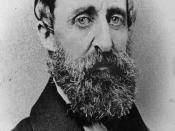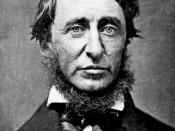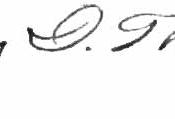It doesn't matter how Webster's dictionary defines justice, because there are so many ways to define it, and everyone seems to disagree on it. Henry David Thoreau and John Howard Griffin lived in different times, and places, yet they both developed unique, but similar views on the topic. Thoreau expresses his views on justice through Civil Disobedience, and Griffin puts these views into action in his book, Black Like Me.
In Civil Disobedience, Thoreau, at one point, says "Society killed Christ" (Thoreau, 2). What he really means is that decisions should be made justly by the human conscience, and be uninfluenced by the majority's opinion. When Jesus Christ was hung on the cross, it was done because the king wanted him killed, and if the king wanted him killed, then society figured that it was just the right thing to do. The people didn't follow their conscience. Griffin did exactly what Thoreau speaks of.
In the time in which he wrote Black Like Me, racial prejudice was very common - accepted even - and Griffin wanted to form his own opinion on the subject. That's why he took a pill that would turn his skin black, and then dyed it some more, so that he changed from an average looking white man to a dark, bald black man. His entire purpose runs parallel with Thoreau's idea of forming your own opinions - he took matters into his own hands to do so.
Another similarity in the views of Griffin and Thoreau is on personal responsibility, and being able to step back and clearly interpret a situation (Thoreau, 14). Thoreau describes this as being able to separate one's self from society or government, and making decisions, not based on what majority says, but again, by forming an opinion based on personal...


